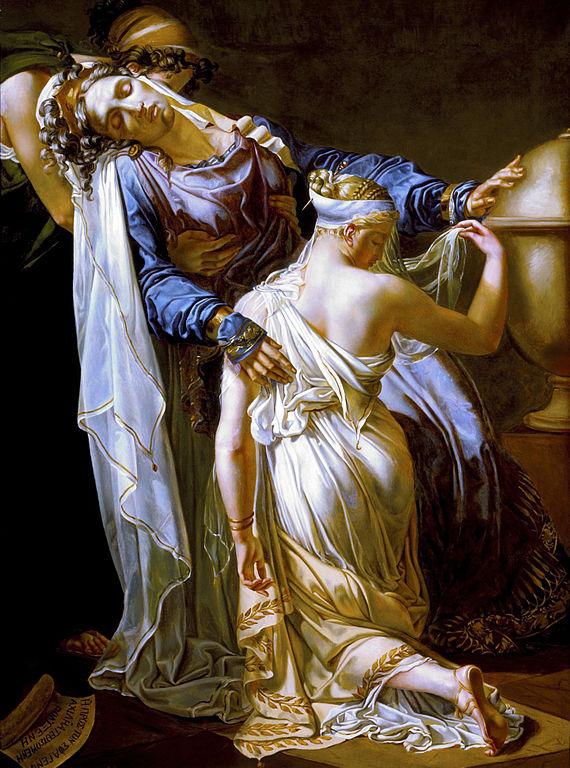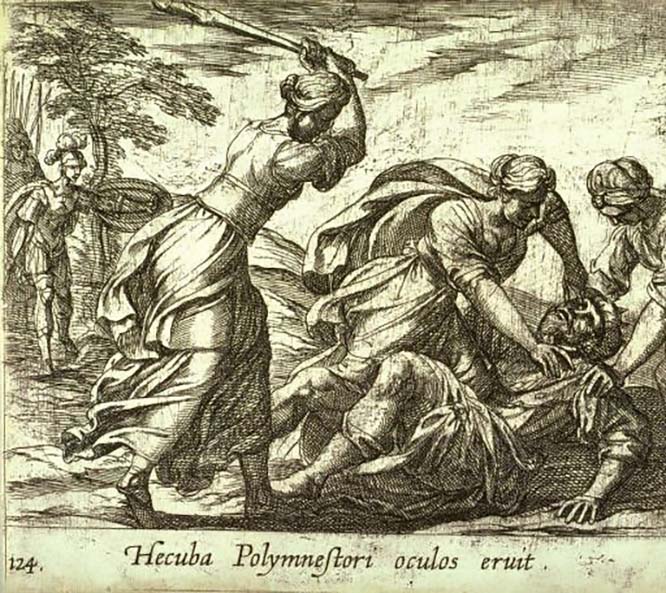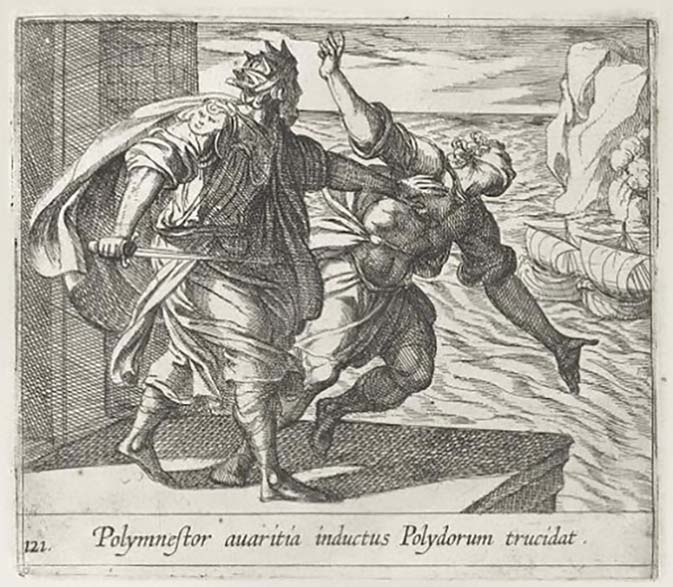Polymestor
In Greek mythology, Polymestor or Polymnestor (Ancient Greek: Πολυμ(ν)ήστωρ) was a King of Thrace. His wife was Ilione, the eldest daughter of King Priam.
Polymestor appears in Euripides' play Hecuba and in the Ovidian myth "Hecuba, Polyxena and Polydorus".
During the Trojan War, King Priam was frightened for his youngest son Polydorus's safety since Polydorus could not fight for himself. Priam sent the child, along with gifts of jewelry and gold, to the court of King Polymestor to keep him away from the fighting. After Troy fell, Polymestor betrayed Priam and threw Polydorus into the ocean in order to keep the treasure for himself.
Hecuba, Polydorus' mother, found the body and discovered the treachery. She asked Agamemnon to bring Polymestor to her. Agamemnon complied, motivated by the love of Cassandra, another of Hecuba's children. Hecuba baits Polymestor by drawing him in with treasure. Hecuba has the other Trojan women kill Polymestor's sons, and blinds Polymestor by scratching his eyes out.
Polymestor is humiliated at having been blinded and made childless at the hands of slave women. Polymestor is given a trial against Hecuba by Agamemnon. Polymestor claims to be working in the Greek's interest by killing Polydorus before he avenges his brothers and father. Hecuba refutes this claim by stating that Greece has no interest in allying with barbarians.
Agamemnon sides with Hecuba and declares Polymestor's actions to be murder. Agamemnon has his soldiers seize Polymestor. As he is being taken away, Polymestor reveals the deaths of Cassandra, the daughter of Hecuba, and Agamemnon.

Now some tell of a different end for Polymestor, one which sees him die at the hands of Polydorus.
In this tale, Iliona would raise both Deipylus, son of Polymestor, and Polydorus, son of Priam, but loving her own parents more than Polymestor, decided to ensure that no matter if anything happened to Deipylus or Polydorus, then Priam and Hecabe would still have a son. To this end, Deipylus was raised as if he was Polydorus, and Polydorus was raised as if he were Deipylus.
During the Trojan War emissaries from Agamemnon came to Polymestor and promised the king wealth and the hand of Electra, daughter of Agamemnon and Clytmenestra, if he would kill the son of Priam. This Polymestor willingly did, but Polymestor killed his own son Deipylus because of the intrigue of Iliona.
Later, Polydorus, who was now a young man, went to the Oracle of Delphi, and whilst there, received a strange statement which told of the death of his parents and that his home city was now in ruins.
Polydorus quickly returned to his home on Thracian Chersonesus still believing that he was Deipylus, son of Polymestor and Iliona, but when home found that his parents were still alive, and his city still whole.
Polydorus would tell Iliona what he had been told by the Oracle of Delphi, and Iliona told him the truth. Polydorus then took up his sword, blinded the man who he had falsely believed to be his father, and then killed Polymestor.
Finally, Polymestor was also a Greek king of Arcadia.

SourceS
Scholia on Ovid. Ibis, 273
Pseudo-Apollodorus. Bibliotheca, 3.5.2
Pausanias. Description of Greece, 2.20.5
Hyginus. Fabulae, 71
Homer, and Stanley Lombardo. Iliad. Indianapolis: Hackett Pub., 1997:399.
Pseudo-Apollodorus. Bibliotheca, Ep.7.29
Quintus Smyrnaeus. Posthomerica, 11.79
Hesiod. Theogony, 978,
Pseudo-Apollodorus. Bibliotheca, 3.4.2,
Diodorus Siculus. Bibliotheca historica, 4.2.1 & Nonnus. Dionysiacca, 5.208
Nonnus. Dionysiacca, 5.208
Nonnus. Dionysiaca, 5.298
Herodotus. The Histories, 5.59, Euripides. The Phoenician Women, 1, Arrian. The Anabasis of Alexander, 2.16.1 & Sophocles. Oedipus Tyrannus, 267
Nonnus. Dionysiaca, 5.207ff
Nonnus. Dionysiaca, 46.259
Pseudo-Apollodorus. Bibliotheca, 3.5.2
Hyginus. Fabulae, 76
Pseudo-Apollodorus. Bibliotheca, 3.5.5 & Pausanias. Description of Greece, 2.6.2 & 9.5.4
Pausanias. Description of Greece, 9.5.3
Pausanias. Description of Greece, 9.12.4
Diodorus Siculus. Bibliotheca historica, 19.53.5
Homer, and Stanley Lombardo. Iliad. Indianapolis: Hackett Pub., 1997:399.
Euripides, (Marilyn Nelson, tr.) Hecuba. U Penn Press, 1998.
Ovidius, Naso Publius (Alan D. Melville, tr.) Metamorphoses. Oxford: Oxford University Press, 1986:307–12.
The king is assumed to be Polymestor although he is not mentioned explicitly.
Virgil (Robert Fitzgerald, tr.) The Aeneid. New York: Knopf, 1992. Print. 66–67.
Virgil; with an English Translation by H. Rushton Fairclough; in Two Volumes (Eclogues, Georgics, Aeneid I-IV). 1. Cambridge and London: Harvard University Press and William Heinemann. 1938. p. 350-353. Retrieved 25 January 2018 – via Internet Archive.
pseudo-Apollodorus, R. Scott Smith, Stephen Trzaskoma, and C. Julius. Hyginus. Apollodorus' Library and Hyginus' Fabulae: Two Handbooks of Greek Mythology. Indianapolis: Hackett Pub., 2007:134.













